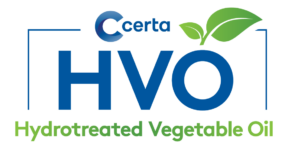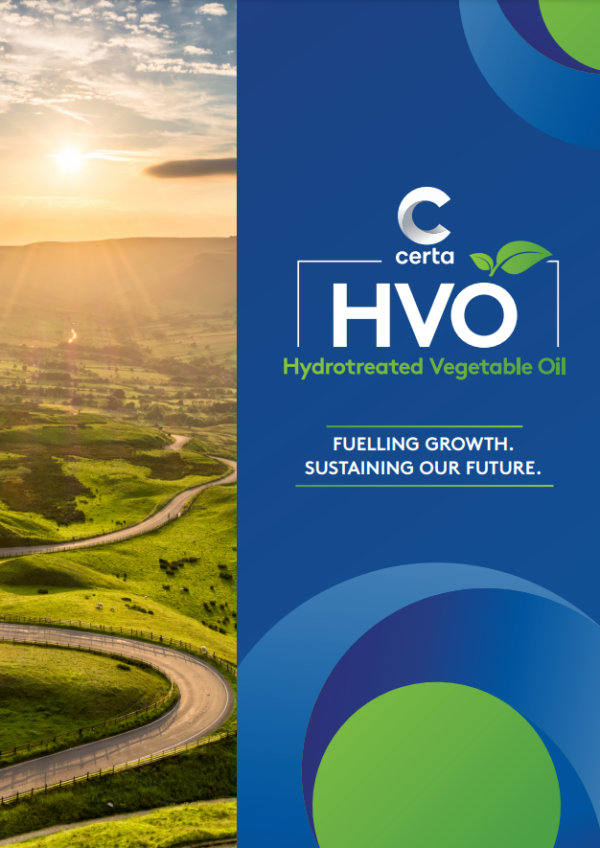HVO: Renewable Diesel for your Business
What is HVO?
HVO (Hydrotreated Vegetable Oil) is a low-carbon biofuel that serves as a direct replacement for regular diesel fuel. It is produced from treating waste plant-matter with hydrogen, which means it does not release any additional carbon emissions into the atmosphere.
HVO can be used as a direct replacement for diesel without any need for vehicle or engine modifications.
What is HVO Made From?
HVO is made from 100% renewable plant-waste matter, and meets bio content requirements with no FAME (Fatty Acid Methyl Ester) included. This ensures that it avoids the instability and operability issues seen by many low blend diesel fuels and high blend biofuels.
Unlike conventional biodiesel, hydrogen is used as a catalyst instead of methanol, which makes HVO a cleaner burning fuel, and ensures a longer shelf life.
What is The Cost of HVO?
HVO offers the quickest and most cost-effective solution for businesses to efficiently reduce their carbon footprint, with a 90% net reduction in CO2 emissions.
- No costs switching existing equipment or engines
- Reduced need for regular testing (FAME and ester-free fuel)
- Can be stored year-round with no need for seasonal stock replacements
- Average 10% reduction in AdBlue consumption
- Reduced storage costs – up to 10 year shelf life
Can HVO be Mixed with Regular Diesel?
HVO fuel is safe to mix with regular diesel at any volume, so there is no need to throw away existing supplies. HVO is 100% interchangeable with regular diesel and there is no requirement to modify engines or equipment.
However, some of the benefits of HVO fuel may be reduced or impacted due to the existing properties of regular diesel. Therefore, when feasible, we suggest you start your HVO journey with a clean tank to ensure its long lifespan and high-quality features.
What is the Difference Between HVO and Biodiesel?
HVO is produced by processing renewable waste lipids from plant matter. Both Biodiesel and HVO fuel are fossil-free alternatives to regular diesel, but are produced by two different methods and follow two different fuel standards.
The main differences between the two are found in their chemical compositions, performances in cold weather and storage qualities. Biodiesel is a first-generation fuel. HVO fuel is a second-generation, more innovative fuel solution with lower maintenance costs due to less risk of degradation, fewer storage concerns, and no heating required during storage.
Who Can Benefit from Using HVO?
HVO fuel is optimised for use across a wide range of sectors as a low carbon alternative to diesel. These sectors include construction, haulage, events, transport, agriculture, marine, data, and tech. HVO is commonly used in:
- Portable Generators
- Commercial Boilers
- Vehicles, Machinery & Equipment
- Boats & Vessels
- Industrial Trucks & Tankers
Some of Ireland's largest festivals and events have already made the switch to HVO fuel to power their sites including Electric Picnic, the Irish Open, and the National Ploughing Championships.



Reduced Carbon Emissions
Reduced Nox Emissions
Reduced Particulate Matter



Renewable
Biodegradable
Odourless



Extreme Temperature Performance
Long Shelf-Life (10x Diesel)
Mixable with Regular Diesel
Where can I learn
more about HVO?
The Certa HVO E-Book is our useful guide for fuelling your business with Hydrotreated Vegetable Oil in 2024:
HVO Case Studies
Get in touch today...
Want to learn how HVO can work for your business?
Talk to Laura, our HVO specialist today to see how your business can make the switch and do great things for your company's carbon footprint.
Or we can call you...











